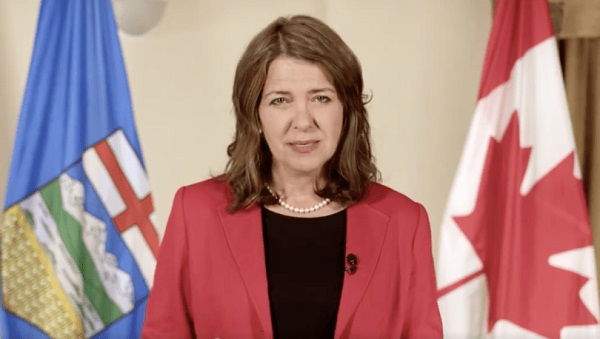Alberta
Media melts down as Danielle Smith moves to end ‘transitioning’ of children in Alberta

From LifeSiteNews
After Alberta’s Danielle Smith put forth legislation to protect kids from being gender ‘transitioned,’ the Canadian media went on a predictable melt down, citing ‘experts’ who blatantly lie to advance the LGBT agenda.
A year after announcing her intention to combat transgender ideology and protect children, Alberta Premier Danielle Smith has tabled three pieces of UCP (United Conservative Party) government legislation:
- The Education Amendment Act 2024 will require parental consent for “socially transitioning” children under the age of 16 (changing a child’s name or “preferred pronouns”). The bill also gives parents an “opt-in” option for any sexual or content at school. Smith has emphasized that the Alberta Teaching Profession Commission has the power to discipline teachers if they decide to break the law.
- The Health Statues Amendment Act 2024 will ban the use of puberty blockers and cross-sex hormones for minors, as well as prohibit sex change surgeries on minors.
- The Fairness and Safety in Sport Act will ban trans-identifying men from female sports teams.
Together, these three bills represent the most definitive pushback against gender ideology in Canada by any premier. Smith’s decision to announce her intent to pursue such legislation and then wait has turned out to be politically savvy—it has given the UCP government a good look at the LGBT response, and during that time the U.K.’s Labour government has successfully fought to maintain a similar ban in the courts and publicly rebutted many of the scare tactics used by LGBT activists.
Smith and the UCP are thus walking into this debate with eyes wide open, and are clearly certain that the public is on their side (it is) and that the legislation can survive the court challenges surely coming from LGBT activists. The policies are clearly popular with the UCP party’s base, who handed Smith a staggering 91.5% approval rating in her leadership review at UCP gathering in Red Deer last Saturday.
The party also passed 35 policy resolutions, including several that indicate the UCP’s willingness to go further in fighting transgender ideology, with resolutions that would restrict “exclusively female spaces” like bathrooms and changerooms to females and designating transgender surgeries as “elective cosmetic procedures” not funded by the taxpayer. The motions received near-unanimous support.
The Canadian press, unsurprisingly, is working hard to present policies that the vast majority of Canadians support as an attack on fundamental norms (albeit norms that only surfaced in the last few years and were never presented to voters). Global News ran the headline: “Alberta unveils 3 sweeping bills affecting trans and gender-diverse youth.” It is important to note that the press accepts the premises of transgender ideology as the starting point for their reporting, with heavy usage of nonsensical phrases like “gender-diverse youth,” which implies that there are many genders.
In fact, Global News and other Canadian outlets trotted out talking points that have been definitively rebutted by the U.K.’s Cass Review and multiple medical studies—in fact, even the New York Times has been reporting on the permanent harms of puberty blockers over the past several years. An example from Global News:
Alberta parents of gender-diverse youth like Haley Wray believe the new laws will give kids less choice — especially when it comes to health-care that is not permanent but instead, gives kids time to work through their identity struggles.
‘Hormone blockers are a very valuable tool,’ Wray said, explaining they have a very small window of effectiveness to pause, but not prevent, puberty. ‘It is reversible because nothing changes. And what that does is it allows youth and families to have that that pause, that break to explore further, validate, understand what this means and know that permanent changes aren’t happening.’
Wray believes the proposed legislation will make the province a less safe place for tens of thousands of Alberta kids who aren’t straight. It’s why, Wray says, a growing number of families with transgender children are now grappling with whether Alberta is a place they can stay. ‘I know people who have, and I know people who genuinely feel like there is likely nowhere to go,’ she said.
This is incorrect. Puberty blockers cause permanent damage, and children may be rendered permanently sterile after taking them for a relatively short period of time. Puberty is not something that can be “paused,” and it frequently causes irreversible rather than reversible damage. Smith and her government understand this, which is why they have decided to pass this legislation—not, as nearly every press outlet claimed, to “target trans youth,” but to protect them.
The CBC chimed in with sentences like this one:
Terms like ‘biological female’ and ‘biological male’ can be used to imply that transgender people are still their assigned sex at birth, despite their identity.
To translate: a scientifically accurate and precise statement is now an ideological one, but inherently ideological language invented by the transgender movement over the past decade is, in fact, technically accurate. People can identify as anything they want; it is irrelevant to their biology. The CBC presents pointing this out as some sort of propagandistic attack on vulnerable people.
Fortunately, Smith appears to know what she’s doing here. She’s taken her time to ensure that the legislation she has put forward will pass, and that it is defensible in court. Saskatchewan Premier Scott Moe, who has just led the Saskatchewan Party to its fifth straight majority government, is of a similar mind—he’s promised to put forward legislation protecting female spaces as a matter of first priority. It took long enough, but Canada’s conservatives are finally starting to move.
2025 Federal Election
Next federal government should recognize Alberta’s important role in the federation

From the Fraser Institute
By Tegan Hill
With the tariff war continuing and the federal election underway, Canadians should understand what the last federal government seemingly did not—a strong Alberta makes for a stronger Canada.
And yet, current federal policies disproportionately and negatively impact the province. The list includes Bill C-69 (which imposes complex, uncertain and onerous review requirements on major energy projects), Bill C-48 (which bans large oil tankers off British Columbia’s northern coast and limits access to Asian markets), an arbitrary cap on oil and gas emissions, numerous other “net-zero” targets, and so on.
Meanwhile, Albertans contribute significantly more to federal revenues and national programs than they receive back in spending on transfers and programs including the Canada Pension Plan (CPP) because Alberta has relatively high rates of employment, higher average incomes and a younger population.
For instance, since 1976 Alberta’s employment rate (the number of employed people as a share of the population 15 years of age and over) has averaged 67.4 per cent compared to 59.7 per cent in the rest of Canada, and annual market income (including employment and investment income) has exceeded that in the other provinces by $10,918 (on average).
As a result, Alberta’s total net contribution to federal finances (total federal taxes and payments paid by Albertans minus federal money spent or transferred to Albertans) was $244.6 billion from 2007 to 2022—more than five times as much as the net contribution from British Columbians or Ontarians. That’s a massive outsized contribution given Alberta’s population, which is smaller than B.C. and much smaller than Ontario.
Albertans’ net contribution to the CPP is particularly significant. From 1981 to 2022, Alberta workers contributed 14.4 per cent (on average) of total CPP payments paid to retirees in Canada while retirees in the province received only 10.0 per cent of the payments. Albertans made a cumulative net contribution to the CPP (the difference between total CPP contributions made by Albertans and CPP benefits paid to retirees in Alberta) of $53.6 billion over the period—approximately six times greater than the net contribution of B.C., the only other net contributing province to the CPP. Indeed, only two of the nine provinces that participate in the CPP contribute more in payroll taxes to the program than their residents receive back in benefits.
So what would happen if Alberta withdrew from the CPP?
For starters, the basic CPP contribution rate of 9.9 per cent (typically deducted from our paycheques) for Canadians outside Alberta (excluding Quebec) would have to increase for the program to remain sustainable. For a new standalone plan in Alberta, the rate would likely be lower, with estimates ranging from 5.85 per cent to 8.2 per cent. In other words, based on these estimates, if Alberta withdrew from the CPP, Alberta workers could receive the same retirement benefits but at a lower cost (i.e. lower payroll tax) than other Canadians while the payroll tax would have to increase for the rest of the country while the benefits remained the same.
Finally, despite any claims to the contrary, according to Statistics Canada, Alberta’s demographic advantage, which fuels its outsized contribution to the CPP, will only widen in the years ahead. Alberta will likely maintain relatively high employment rates and continue to welcome workers from across Canada and around the world. And considering Alberta recorded the highest average inflation-adjusted economic growth in Canada since 1981, with Albertans’ inflation-adjusted market income exceeding the average of the other provinces every year since 1971, Albertans will likely continue to pay an outsized portion for the CPP. Of course, the idea for Alberta to withdraw from the CPP and create its own provincial plan isn’t new. In 2001, several notable public figures, including Stephen Harper, wrote the famous Alberta “firewall” letter suggesting the province should take control of its future after being marginalized by the federal government.
The next federal government—whoever that may be—should understand Alberta’s crucial role in the federation. For a stronger Canada, especially during uncertain times, Ottawa should support a strong Alberta including its energy industry.
Alberta
Province announces plans for nine new ‘urgent care centres’ – redirecting 200,000 hospital visits

Expanding urgent care across Alberta
If passed, Budget 2025 includes $17 million in planning funds to support the development of urgent care facilities across the province.
As Alberta’s population grows, so does the demand for health care. In response, the government is making significant investments to ensure every Albertan has access to high-quality care close to home. Currently, more than 35 per cent of emergency department visits are for non-life-threatening conditions that could be treated at urgent care centres. By expanding these centres, Alberta’s government is enhancing the health care system and improving access to timely care.
If passed, Budget 2025 includes $15 million to support plans for eight new urgent care centres and an additional $2 million in planning funds for an integrated primary and urgent care facility in Airdrie. These investments will help redirect up to 200,000 lower-acuity emergency department visits annually, freeing up capacity for life-threatening cases, reducing wait times and improving access to care for Albertans.
“More people are choosing to call Alberta home, which is why we are taking action to build capacity across the health care system. Urgent care centres help bridge the gap between primary care and emergency departments, providing timely care for non-life-threatening conditions.”
“Our team at Infrastructure is fully committed to leading the important task of planning these eight new urgent care facilities across the province. Investments into facilities like these help strengthen our communities by alleviating strains on emergency departments and enhance access to care. I am looking forward to the important work ahead.”
The locations for the eight new urgent care centres were selected based on current and projected increases in demand for lower-acuity care at emergency departments. The new facilities will be in west Edmonton, south Edmonton, Westview (Stony Plain/Spruce Grove), east Calgary, Lethbridge, Medicine Hat, Cold Lake and Fort McMurray.
“Too many Albertans, especially those living in rural communities, are travelling significant distances to receive care. Advancing plans for new urgent care centres will build capacity across the health care system.”
“Additional urgent care centres across Alberta will give Albertans more options for accessing the right level of care when it’s needed. This is a necessary and substantial investment that will eventually ease some of the pressures on our emergency departments.”
The remaining $2 million will support planning for One Health Airdrie’s integrated primary and urgent care facility. The operating model, approved last fall, will see One Health Airdrie as the primary care operator, while urgent care services will be publicly funded and operated by a provider selected through a competitive process.
“Our new Airdrie facility, offering integrated primary and urgent care, will provide same-day access to approximately 30,000 primary care patients and increase urgent care capacity by around 200 per cent, benefiting the entire community and surrounding areas. We are very excited.”
Alberta’s government will continue to make smart, strategic investments in health facilities to support the delivery of publicly funded health programs and services to ensure Albertans have access to the care they need, when and where they need it.
Budget 2025 is meeting the challenge faced by Alberta with continued investments in education and health, lower taxes for families and a focus on the economy.
Quick facts
- The $2 million in planning funds for One Health Airdrie are part of a total $24-million investment to advance planning on several health capital initiatives across the province through Budget 2025.
- Alberta’s population is growing, and visits to emergency departments are projected to increase by 27 per cent by 2038.
- Last year, Alberta’s government provided $8.4 million for renovations to the existing Airdrie Community Health Centre.
Related information
-

 Business1 day ago
Business1 day agoCuba has lost 24% of it’s population to emigration in the last 4 years
-

 Media19 hours ago
Media19 hours agoTop Five Huge Stories the Media Buried This Week
-

 2025 Federal Election19 hours ago
2025 Federal Election19 hours ago2025 Federal Election Interference from China! Carney Pressed to Remove Liberal MP Over CCP Bounty Remark
-

 Automotive2 days ago
Automotive2 days agoTrump warns U.S. automakers: Do not raise prices in response to tariffs
-

 Addictions2 days ago
Addictions2 days agoThere’s No Such Thing as a “Safer Supply” of Drugs
-

 Uncategorized17 hours ago
Uncategorized17 hours agoPoilievre on 2025 Election Interference – Carney sill hasn’t fired Liberal MP in Chinese election interference scandal
-

 Censorship Industrial Complex14 hours ago
Censorship Industrial Complex14 hours agoWelcome to Britain, Where Critical WhatsApp Messages Are a Police Matter
-

 Business2 days ago
Business2 days agoTariff-driven increase of U.S. manufacturing investment would face dearth of workers










